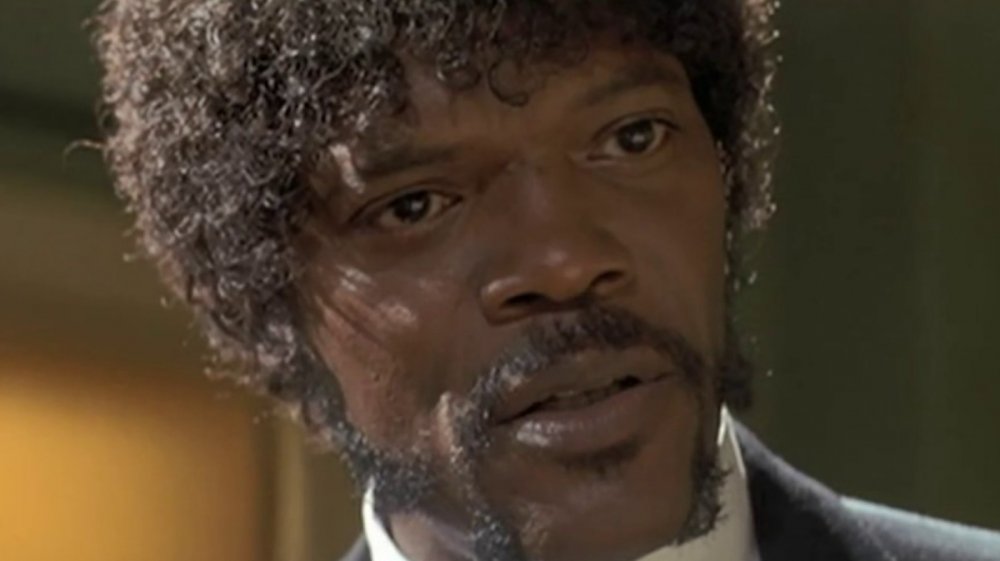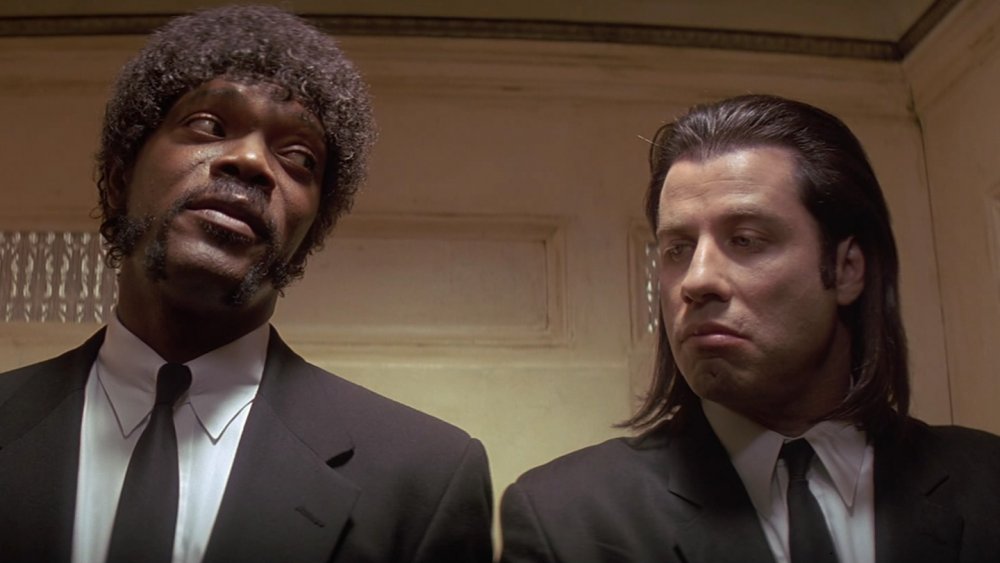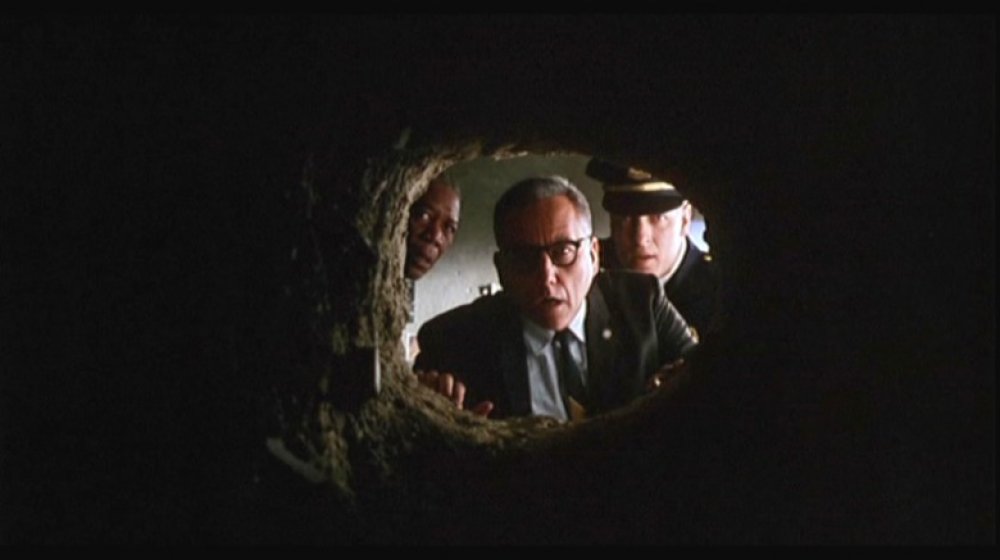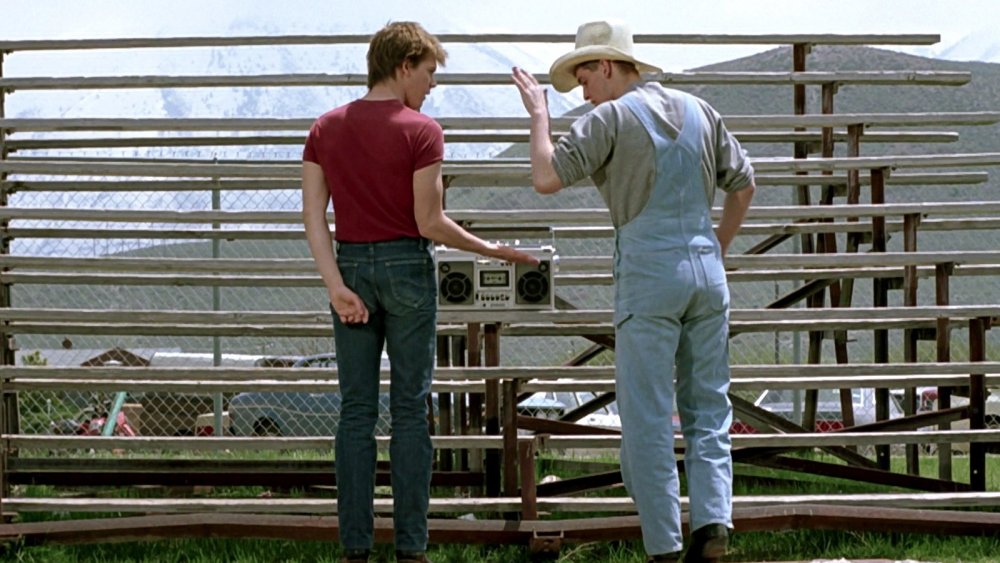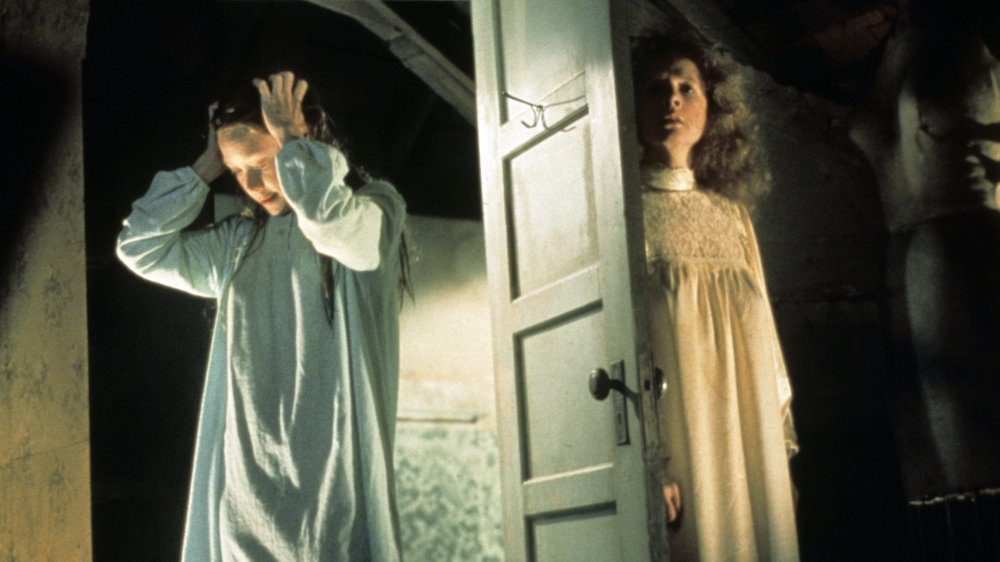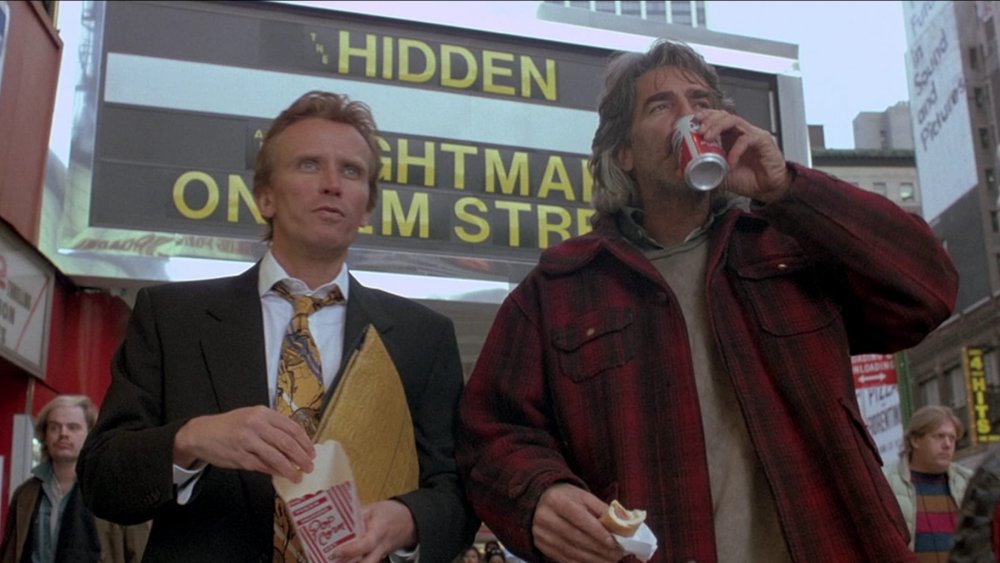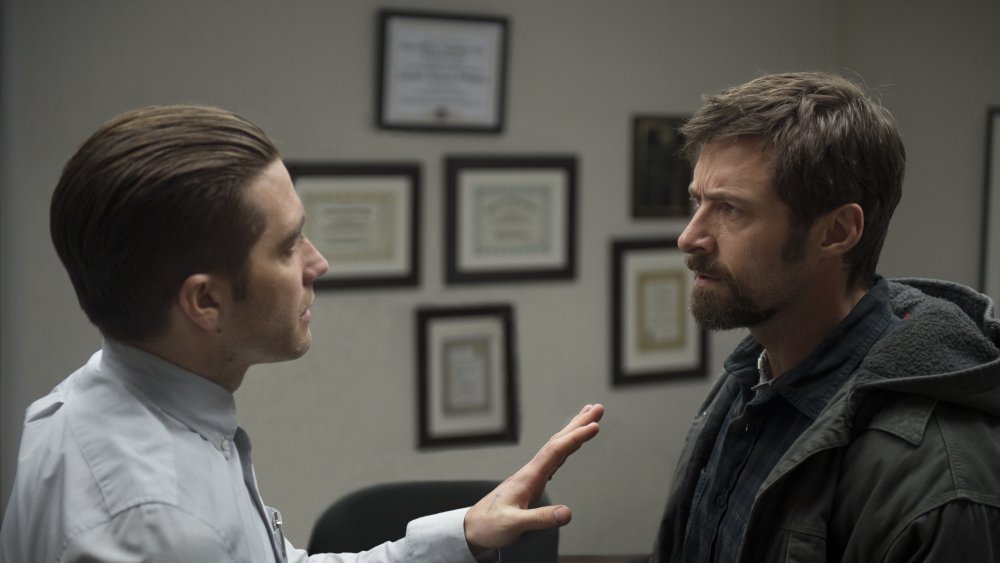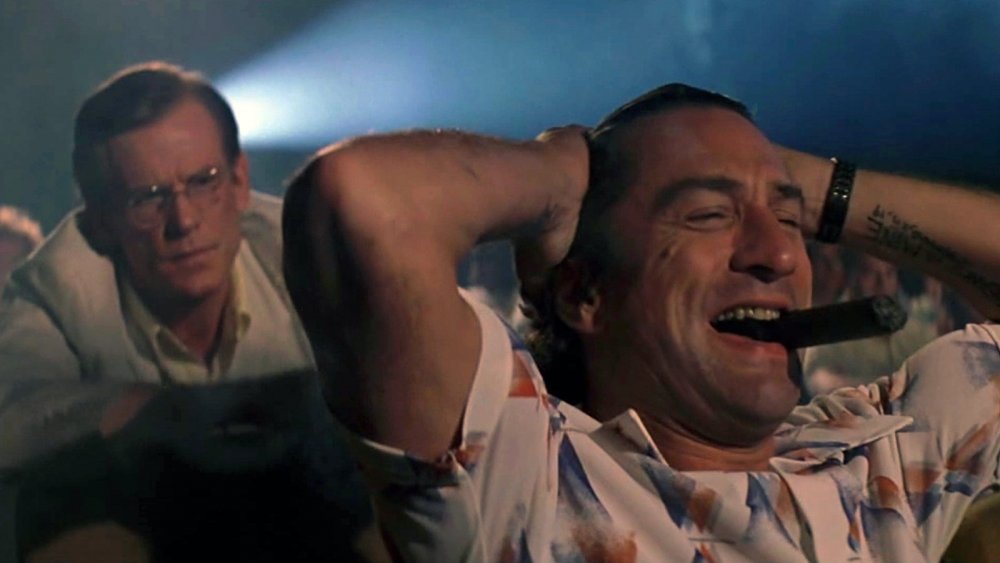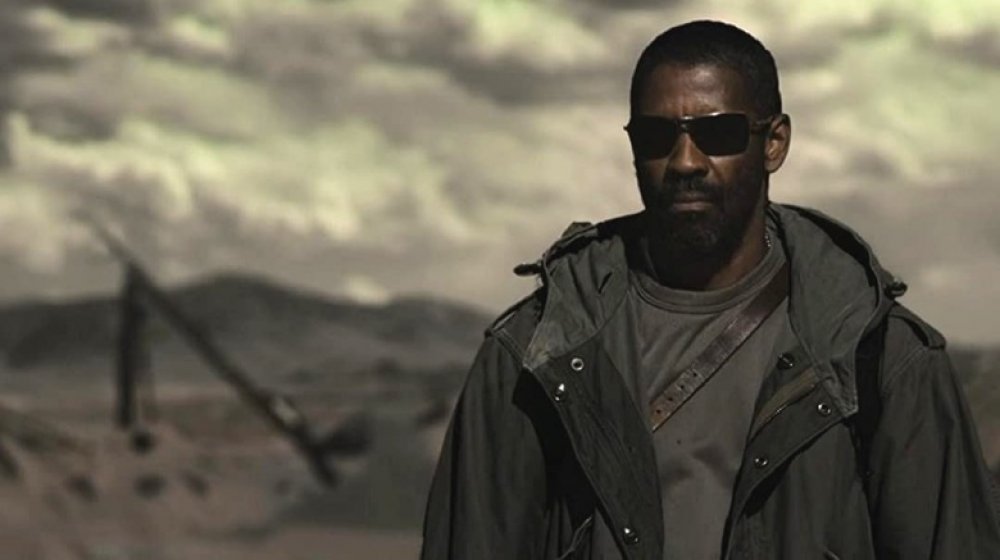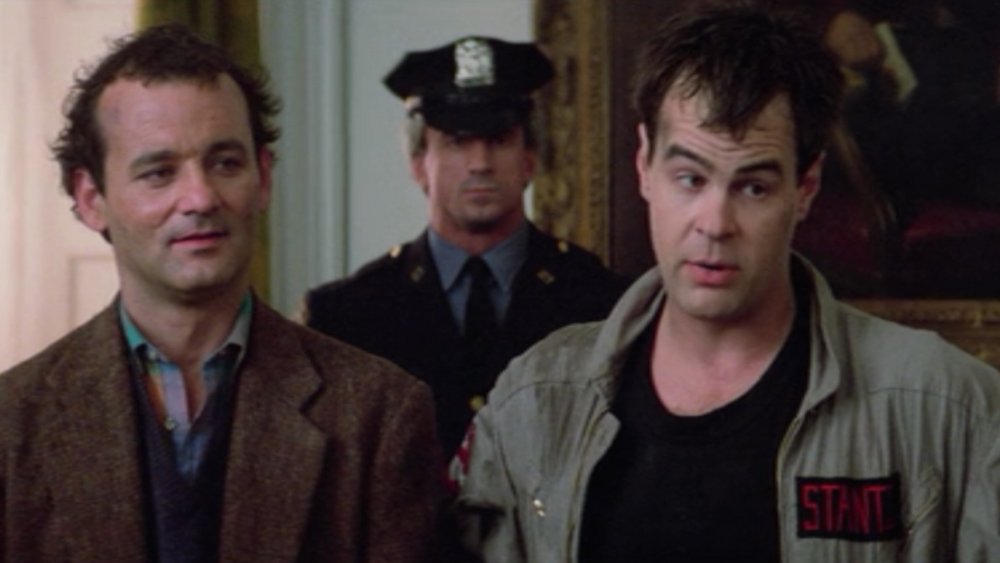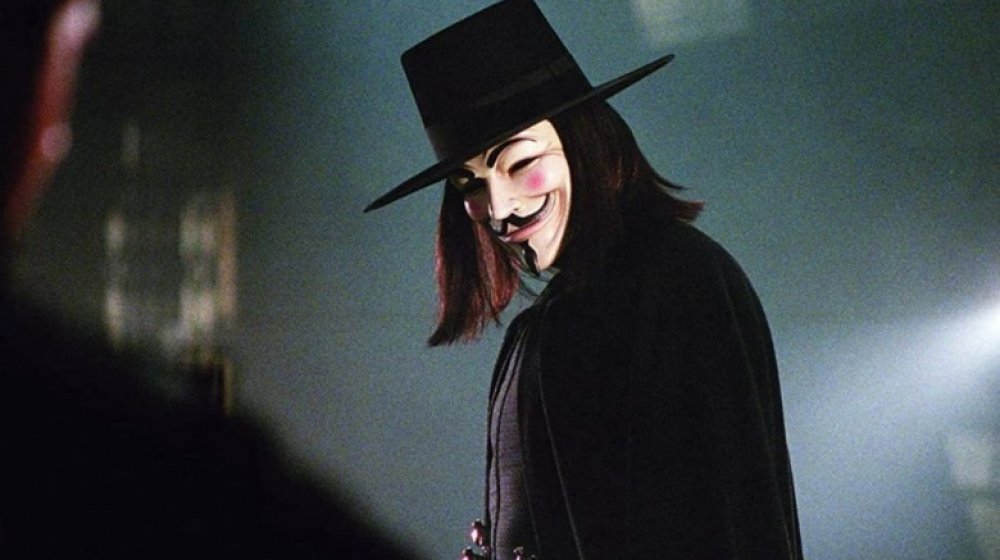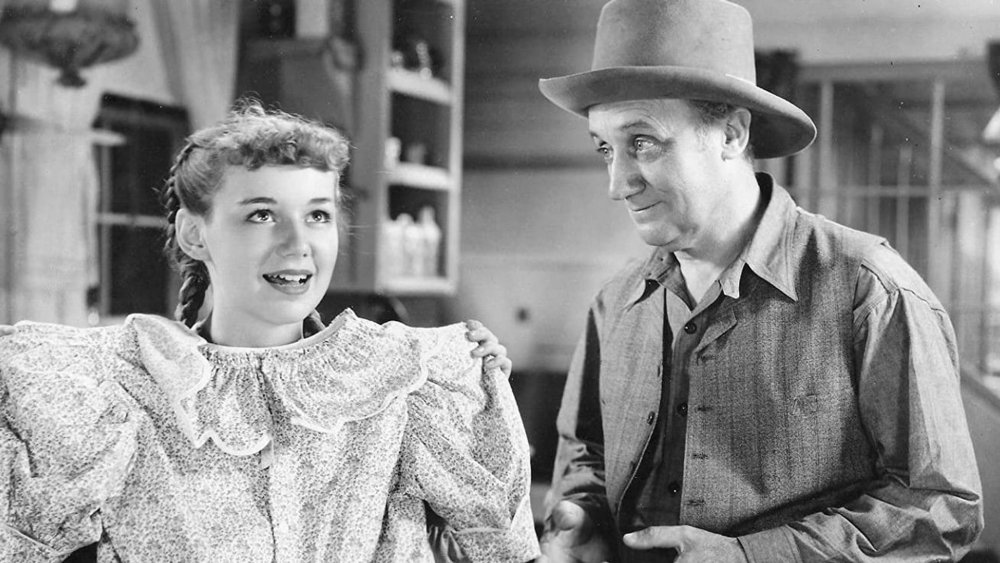Fake Bible Verses Used In Movies
Is there anything more eminently quotable than the Bible? Not only is it a foundational piece of literature — nearly everyone knows at least a little about the Bible — but, well, it's about the implication. When you quote the Bible, you're quoting the word of God. You're calling upon the perception of higher power. Your proof and your pudding are baked in.
So, it's no wonder that movies often call upon biblical scripture. It creates a sense of drama, it tells you something about the characters, and let's face it — it's an easy screenwriting trick. The Bible provides a sort of shared commonality between the language of the characters and the understanding of the audience. Or does it?
In actuality, about 31 percent of Americans have never read the Bible, and ten percent read it less than once a year. A lot of people are unfamiliar enough with the Bible that you could throw pretty much any quote in a movie and claim that it came from it.
There are really two types of biblical misquotes, both of which we'll explore. Some of them are direct misquotes — and then there are phrases thought to be biblical that don't really come from anywhere. So, let's take a look at some of the most popular — and fictional — biblical quotes in movies.
Let's start with the obvious: Pulp Fiction (1994)
"And you will know my name is the Lord when I lay my vengeance upon thee."
By far the most famous fake biblical quote appears in Pulp Fiction – and nowhere else. As noted by Screen Rant, director Quentin Tarantino rewrote a real biblical scripture to make the quote more sensible in terms of his narrative. (Of course, we also know that Tarantino is big on rewriting history, so it shouldn't be a surprise. He made an entire movie about killing Hitler, after all.)
In Pulp Fiction, Jules is initially an entity of wrath and vengeance. He utters this biblical quote when he kills people, considering it something "cold" to visit upon them just before their death. But during the movie's non-chronological plot, he has an awakening. He realizes that the quote really means he can guide people on a more peaceful path: He can become a shepherd.
This wouldn't have been possible with the original biblical quotes. In their modified form, they provide a more concise message. So, one can argue that the biblical quotes (while altered) still remain true to their initial intent, by positioning Jules as less of an avenging angel and more of a guardian spirit.
The Shawshank Redemption (1994)
"His judgment cometh, and that right soon."
There are a few Biblical quotes laced throughout The Shawshank Redemption, so many assume that the warden's placard — "His judgment cometh, and that right soon" – is a biblical quotation. It's clearly intended to be one, but it's not, per Reference.com. It's not from anywhere. The closest quote in the Bible is: "A prayer out of a poor man's mouth reacheth to the ears of God, and his judgment cometh speedily." That encapsulates the message itself but doesn't quite hit the right words. So, why the discrepancy?
It could be as simple as the second quote not fitting neatly on a cross-stitch. But it's also an issue very similar to Pulp Fiction: The quote is meant to reflect something profound and meaningful about the story. It can't do that without being distilled into the essence of the story.
The Shawshank Redemption is all about judgment — when it comes for you and how you deliver it upon yourself. "His judgment cometh, and that right soon" may have simply felt appropriately dramatic (and biblical) when the story was first penned.
Footloose (1984)
"Praise ye the lord. Sing unto the lord a new song. Let him praise His name in the dance."
Would you consider Footloose a biblically accurate movie? Maybe you should. Of all the movies on this list, Footloose actually comes the closest to getting a biblical quote right. The problem, however, is that it's only half the sentence. The full biblical quote reads, "Let them praise his name with dancing and make music to him with timbrel and harp."
That might not seem significant, but in the context of the movie it is. In Footloose, they're (of course) arguing that dancing is a way to worship and pray. But the full quote provided is actually outlining a very specific worship ceremony. The Bible probably wasn't requesting some dirty dancing in the form of worship — unless it included timbrel and harp.
That being said, Footloose makes a pretty decent biblical argument, especially when it later points out that David celebrated by "leaping and dancing before the Lord." The Bible does, as a whole, support the idea that dancing is a valuable method of worship, which is really all that Footloose set out to do.
Carrie (1976)
"The first sin was intercourse."
Carrie is your traditional story of a young, psychically gifted girl being abused by a religious and psychotically delusional mother. You know — a real coming of age tale.
Throughout Carrie, Carrie's mother frequently quotes the Bible, forcing Carrie herself to pray to an immense effigy of Jesus while locked in a closet. But the mother isn't really quoting the Bible. One of the most notable comments she makes is "The first sin was intercourse," which is found nowhere within biblical scripture. In fact, the first sin was eating an apple of knowledge — far less risqué.
In the 2013 version, Carrie counters with a real biblical quote, Psalm 136: "Give thanks to the Lord, for he is good. His lord endures forever." In this way, Carrie and Carrie's mother are diametrically opposed in the way that many religious faiths are. Carrie believes that religion is about joy and love — Carrie's mother believes that religion is about suffering and pain. Unfortunately, Carrie lives in the Stephen King universe, so the latter was always more likely to win.
Shakedown (1988)
"There is nothing covered up that shall not be uncovered. There is nothing hidden that shall not be known. Whatever I say to you in the dark, you must repeat in the daylight. And whatever is whispered, you must shout from the rooftops."
If you've never heard of Shakedown, a 1988 action/crime drama ... well, it's not a surprise. In Shakedown, a lawyer and a good cop team up to stop a bad cop. If that sounds bland, IMDB agrees: It maintains an unimpressive 6.0 out of 10. But let's say that you're a huge Sam Elliot fan (and who isn't?). At minimum, you'll be treated to some exceptionally dramatic prose. At one point in the crime drama, Peter Weller's character (Roland Dalton) comes out with the above scenery-chewing quote – in front of a jury, no less.
In context, it makes sense. This is, after all, a movie about exposing corrupt cops. But the passage he's talking about is Matthew 10, verses 26-27: "So do not be afraid of them, for there is nothing concealed that will not be disclosed, or hidden that will not be made known."
While the movie's speech ends with an entreaty toward honesty (with the idea that truth will always win out), the quote itself is actually very specific — it's about not fearing persecution or opposition, according to Knowing Jesus. Notably, the movie misquotes it by using the word "uncovered" rather than "disclosed," likely because of the context.
Prisoners (2013)
"Our Father, who art in Heaven, hallowed be thy name. Thy kingdom come, thy will be done, on earth as it is in heaven. Give us this day our daily bread, and forgive us our trespasses, as we forgive those who trespass against us. Lead us not into temptation, but deliver us from evil. For the kingdom, the power and the glory are yours, now and forever. Amen."
The Lord's Prayer frequently finds its way into movies — and Prisoners is only one example. But did you know that the Lord's Prayer is frequently changed? In the Catholic faith, the prayer often ends with "For the kingdom, the power, and the glory are yours, now and forever. Amen." But this actually does not show up in Matthew 5-15, where the Lord's Prayer does.
The Lord's Prayer is like many religious artifacts: It actually has multiple versions, per The Independent. Some arguments are as miniscule as wondering whether it's "Our Father in heaven," "Our Father who art in heaven," or "Our Father which art in heaven." And while you may think that's a small inconsistency, biblical scholars have actually been debating it for many years.
Either way, the general thrust of the prayer remains the same — and the cultural differences are a part of what makes it interesting.
Cape Fear (1991)
"I am like God and God like me. I am as large as God, he is as small as I. He cannot be above me, nor I beneath him be."
In Cape Fear, Robert De Niro's bombastic exclamation is often thought to be a biblical quote. Why? First, it just sounds biblical, and the way that he says it certainly doesn't hurt. But, also, he follows it up with a name and a number — after the above quote, he says, "Silesius, 17th century." He's really referring to a quote from a poet, but the confusion is understandable, especially for those not well-acclimated to the Bible.
De Niro's Cape Fear character, Max Cady, is the antagonist of the 1991 remake, hell-bent on revenge after he suspects that his public defender did not render him the most accurate defense. The Silesius quote is perfect for the character: a psychopath who prides himself on being well-read and well-learned. Thus, the relative obscurity of the quote is part of the point.
And the quote itself is quite interesting — in it, the poet Silesius is reflecting upon the relationship between man and God and perhaps intimating that God and man are truly one entity. Solipsistic, the poet asks us to consider that if we ourselves can fathom God, then we also contain God, not far off from a message the Bible might portray.
The Book of Eli (2010)
"Cursed be the ground for our sake. Both thorn and thistles it shall bring forth for us. For out of the ground we were taken, for the dust we are... and to the dust we shall return."
In this post-apocalyptic movie starring Denzel Washington, a lone man fights his way across a nuclear-ravaged land to protect a book: the Bible. Eli's copy of the Bible is the very last one. All other copies were destroyed. Eli frequently quotes the Bible during The Book of Eli, which makes sense, given the situation. But he actually isn't quoting the Bible correctly. The above quote is actually a mishmash of Genesis 3:17-19, which reads:
"Cursed is the ground for your sake. In toil you shall eat of it. All the days of your life. Both thorns and thistles it shall bring forth for you. And you shall eat the herb of the field. In the sweat of your face you shall eat bread. Till you return to the ground, For out of it you were taken; For dust you are, And to dust you shall return."
It's easy to see why he modified it for brevity, and the modified quote does have more thematic relevance.
Ghostbusters (1984)
"And I looked, and he opened the sixth seal, and behold there was a great earthquake. And the sun became black as sackcloth, and the moon became as blood."
Everyone loves to quote the Book of Revelation. It's by far the most fun part of the Bible. In Ghostbusters, Ray is asked if he remembers anything from the Bible about the dead rising — so naturally, he begins the above quote by saying, "I remember Revelations 7:12."
This one's less a misquote and more a complete goof: the passage is actually Revelations 6:12. But it's also at least partly a misquote, as the appropriate line is, "And I beheld when he had opened the sixth seal, and, lo, there was a great earthquake; and the sun became black as sackcloth of hair, and the moon became as blood."
Perhaps the movie writers didn't want the audience wondering what a "sackcloth" of hair was. It's not a cloth full of hair: In the olden times, a sackcloth was a coarsely woven fabric usually made out of goat hair. That being said, Ray isn't exactly a biblical scholar — and this may be an intentional way of highlighting that.
My Best Friend's Wedding (1997)
"This, too, shall pass."
One of the most common biblical phrases, often whipped out to soothe someone going through a hard time, "This, too, shall pass" finds itself on everything from internet memes to family cross-stitching. The only problem? It's not in the Bible. In My Best Friend's Wedding, Julianne Potter is trying to sabotage, well, her best friend's wedding — having recently realized that she is in love with him. During the movie, a bellman comforts her, saying: "This, too, shall pass."
It makes sense that this quote has become so ubiquitous: It's something that can be said for any type of grief or disaster. And because it's such a short, pithy aphorism, it's also easy to see why it has become so commonly attributed to the Bible. But it's more than that, in a very interesting way. As noted by Christianity.com, "This, too, shall pass" may actually come from ancient Jewish folklore – the same well that the Old Testament itself was drawn from.
Thus, it makes sense that "This, too, shall pass" was passed down through the same traditions of the Bible and thereby became inextricably linked.
V for Vendetta (2005)
"Spare the rod, spoil the child."
In the same vein as "This, too, shall pass," everyone from Smallville to Star Trek has included this biblical quote. But again, it's not a biblical quote — everyone just thinks it is. The closest to this is Proverbs 13:24: "He that spareth his rod hateth his son; but he that loveth him chasteneth him betimes."
"Spare the rod, spoil the child" is actually from a poem based on the Bible, not the Bible itself. The original quote is a little more complex: It indicates that if you love your child, you will not spoil them. Meanwhile, the condensed quote comes off more as an argument for direct corporal punishment.
In V for Vendetta, the phrase is clearly used as a Biblical reference. Before dropping the quote, V says, "We're oft to blame, and this is too much proved, that with devotion's visage and pious action we do sugar on the devil itself." But while it may capture the general thrust of the Bible's message, it's not quite the Biblical scripture as it was originally intended.
Atlas Shrugged II (2012)
"Money is the root of all evil."
This is an interestingly tricky one, not because it isn't a clear misquote — which it is — but because the misquote actually radically changes its message.
"Money is the root of all evil" is frequently in all types of media and always attributed to the Bible. In Atlas Shrugged II: The Strike, it's used as a truncated version of a famous speech in the book, one that questions the very premise of money being evil at all. But what's absent in that is questioning where the phrase even began. Here's the real quote in Timothy 6:10: "For the love of money is a root of all kinds of evil. Some people, eager for money, have wandered from the faith and pierced themselves with many griefs."
This is radically different. The commonly traded quote indicates that all evil comes from money. The real biblical quote indicates that many types of evil can potentially stem from the love of money. In this situation, the "quoted" biblical text has become simplified and more catastrophic with time. And while it certainly delivers a firmer message that way, it's not at all what the Bible initially indicated.
Anne of Green Gables (1934)
"Pride goes before the fall."
Anne of Green Gables gets a little dark: The preceding line to this is "Well, Marilla. She'll kill herself, that's all there is to it." The phrase also shows up in the book.
"Pride goes before the fall" is another quintessential biblical phrase that's actually a gross simplification. Proverbs 16:18 actually reads, "Pride goes before destruction, a haughty spirit before a fall." This is followed up with, "Better to be lowly in spirit along with the oppressed than to share plunder with the proud."
The phrase is definitely speaking out against pride: the idea that pride itself can cause a sort of spiritual destruction. But in the Bible, it's not pride itself that leads to a fall but rather a "haughty spirit" originating from it. As with many of the quotes in the Bible, it all comes down to one thing: Don't be a jerk. And because people don't actually go around quoting full scripture to each other all the time, it has become condensed in modern parlance.
